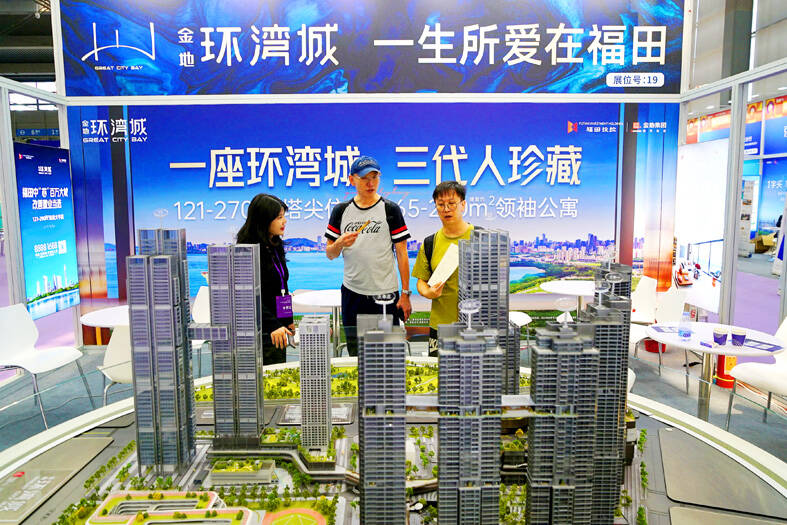China’s regulators pledged to boost efforts to stabilize the housing and equity markets, as well as conduct more effective fiscal policies, in the wake of a meeting of top leaders that called for greater stimulus.
The government would promote the recovery of the property market through measures such as increasing demand and controlling the supply of land for new development, China News Service reported, citing Chinese Vice Minister of Housing and Urban-Rural Development Dong Jianguo (董建國) at a conference on Saturday.
The China Securities Regulatory Commission said it would enhance market monitoring for futures and spot trading, and strengthen supervision of margin trading, derivatives and quantitative trading, according to a statement on its Web site.

Photo: REUTERS
The Chinese Ministry of Finance said it would implement more effective and sustained fiscal policies next year, as well as improve macroeconomic regulations.
The government would also increase the issuance and usage of local government special bonds and expand their investment areas, according to a statement on its Web site.
The comments come after officials led by Chinese President Xi Jinping (習近平) vowed to raise the fiscal deficit target next year following a two-day huddle of the Chinese Central Economic Work Conference in Beijing. For only the second time in at least a decade, they made “lifting consumption vigorously” and stimulating overall domestic demand their top priority.
China’s struggling economy has rebounded modestly in recent weeks on the back of more government support, with signs of improvement in consumption and factory activity.
However, overall confidence remains frail because policies have not been strong enough to free the economy from deflation.
In a sign of the challenges facing policymakers, China’s credit expansion unexpectedly slowed last month, figures showed on Friday. Loans extended to the real economy, which exclude those issued to financial institutions, fell to the lowest for the month of November since 2009. That offset elevated government bond issuance to drag down overall credit growth.
More easing is on the cards. China would cut interest rates and the reserve requirement ratio in a timely manner next year, the 21st Century Business Herald reported on Saturday, citing Wang Xin (王信), director of the research bureau under the People’s Bank of China (PBOC).
The central bank would increase the intensity of monetary and credit supply, Wang said at an event on Saturday, according to the report. Financing conditions for the real economy would also be relaxed further, it cited Wang as saying.
The comments came days after the Chinese politburo pledged to embrace a “moderately loose” monetary policy next year.
The central bank would also improve how it manages exchange rate expectations and guard against any shocks next year, a senior official said.
The PBOC would “step up expectation management on exchange rates and vigorously respond to external shocks,” the monetary policy department head Zou Lan (鄒瀾) told state media in an interview published on Friday.
In addition, the central bank would “resolutely prevent risks of overshooting in the exchange rate,” he said.
The yuan has fallen sharply since mid-October and slid on Thursday after a media report said authorities were considering letting it depreciate in response to the threat of a trade war with the US.

Intel Corp chief executive officer Lip-Bu Tan (陳立武) is expected to meet with Taiwanese suppliers next month in conjunction with the opening of the Computex Taipei trade show, supply chain sources said on Monday. The visit, the first for Tan to Taiwan since assuming his new post last month, would be aimed at enhancing Intel’s ties with suppliers in Taiwan as he attempts to help turn around the struggling US chipmaker, the sources said. Tan is to hold a banquet to celebrate Intel’s 40-year presence in Taiwan before Computex opens on May 20 and invite dozens of Taiwanese suppliers to exchange views

Application-specific integrated circuit designer Faraday Technology Corp (智原) yesterday said that although revenue this quarter would decline 30 percent from last quarter, it retained its full-year forecast of revenue growth of 100 percent. The company attributed the quarterly drop to a slowdown in customers’ production of chips using Faraday’s advanced packaging technology. The company is still confident about its revenue growth this year, given its strong “design-win” — or the projects it won to help customers design their chips, Faraday president Steve Wang (王國雍) told an online earnings conference. “The design-win this year is better than we expected. We believe we will win

Chizuko Kimura has become the first female sushi chef in the world to win a Michelin star, fulfilling a promise she made to her dying husband to continue his legacy. The 54-year-old Japanese chef regained the Michelin star her late husband, Shunei Kimura, won three years ago for their Sushi Shunei restaurant in Paris. For Shunei Kimura, the star was a dream come true. However, the joy was short-lived. He died from cancer just three months later in June 2022. He was 65. The following year, the restaurant in the heart of Montmartre lost its star rating. Chizuko Kimura insisted that the new star is still down

While China’s leaders use their economic and political might to fight US President Donald Trump’s trade war “to the end,” its army of social media soldiers are embarking on a more humorous campaign online. Trump’s tariff blitz has seen Washington and Beijing impose eye-watering duties on imports from the other, fanning a standoff between the economic superpowers that has sparked global recession fears and sent markets into a tailspin. Trump says his policy is a response to years of being “ripped off” by other countries and aims to bring manufacturing to the US, forcing companies to employ US workers. However, China’s online warriors